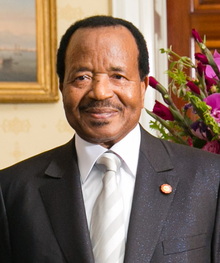Paul Biya
| Paul Biya | |
|---|---|
 |
|
| 2nd President of Cameroon | |
|
Assumed office 6 November 1982 |
|
| Prime Minister |
Bello Bouba Maigari Luc Ayang Sadou Hayatou Simon Achidi Achu Peter Mafany Musonge Ephraïm Inoni Philémon Yang |
| Preceded by | Ahmadou Ahidjo |
| Prime Minister of Cameroon | |
|
In office 30 June 1975 – 6 November 1982 |
|
| President | Ahmadou Ahidjo |
| Preceded by | Position established |
| Succeeded by | Bello Bouba Maigari |
| Personal details | |
| Born |
13 February 1933 Mvomeka'a, French Cameroons (now Cameroon) |
| Political party | People's Democratic Movement |
| Spouse(s) |
Jeanne-Irène Biya (Before 1992) Chantal Vigouroux (1994–present) |
| Alma mater |
National School of Administration, Paris Institute of Political Studies, Paris |
| Religion | Roman Catholicism |
Paul Biya (born Paul Barthélemy Biya'a bi Mvondo, 13 February 1933) is a Cameroonian politician who has been the President of Cameroon since 6 November 1982. A native of Cameroon's south, Biya rose rapidly as a bureaucrat under President Ahmadou Ahidjo in the 1960s, serving as Secretary-General of the Presidency from 1968 to 1975 and then as Prime Minister of Cameroon from 1975 to 1982. He succeeded Ahidjo as President upon the latter's surprise resignation in 1982 and consolidated power in a 1983–1984 power struggle with his predecessor. Biya introduced political reforms within the context of a one-party system in the 1980s. Under pressure, he accepted the introduction of multiparty politics in the early 1990s. He narrowly won the 1992 presidential election with 40% of the plural, single-ballot vote and was re-elected by large margins in 1997, 2004, and 2011. Opposition politicians and Western governments have alleged voting irregularities and fraud on each of these occasions.
Biya has maintained Cameroon's close relationship with France, Cameroon's former colonial ruler.
Paul Biya was born in the village of Mvomeka'a in the South Region of Cameroon. He studied at lycée Louis-le-Grand, Sorbonne and Sciences Po Paris, where he graduated in 1961 with a diploma in International Relations. He married Jeanne-Irène Biya, who did not have any children, though she adopted Franck Biya who was born from a relationship of Paul Biya with another woman. After Jeanne-Irène Biya died on 29 July 1992, Paul Biya married Chantal Biya (38 years younger than himself) on 23 April 1994, and had two more children with her.
As an official in post-independence 1960s Cameroon, Biya rose to prominence under President Ahmadou Ahidjo. After becoming Director of the Cabinet of the Minister of National Education in January 1964 and Secretary-General of the Ministry of National Education in July 1965, he was named Director of the Civil Cabinet of the President in December 1967 and Secretary-General of the Presidency (while remaining Director of the Civil Cabinet) in January 1968. He gained the rank of Minister in August 1968 and the rank of Minister of State in June 1970, while remaining Secretary-General of the Presidency. Following the creation of a unitary state in 1972, he became Prime Minister of Cameroon on 30 June 1975. In June 1979, a law designated the Prime Minister as the President's constitutional successor. Ahidjo unexpectedly announced his resignation on 4 November 1982, and Biya accordingly succeeded him as President of Cameroon on 6 November.
...
Wikipedia
